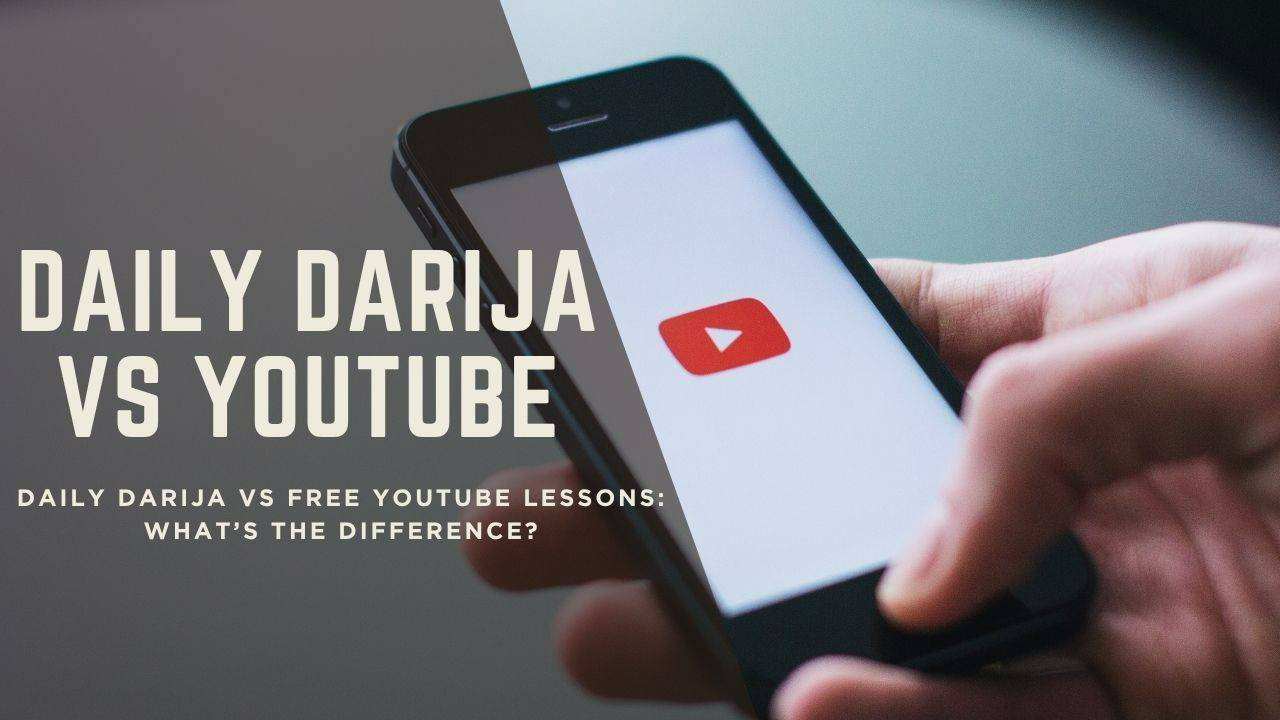Daily Darija vs Free YouTube Lessons: What’s the Difference?

Introduction: The Big Question — Should You Learn Darija for Free on YouTube or Join a Course?
If you’ve ever searched “learn Moroccan Arabic” on YouTube, you’ve probably found dozens of videos — greetings, numbers, common phrases, and even mini grammar lessons.
So, why do so many students still decide to join the Daily Darija course instead of just using free content online?
The answer is simple: structure, progress, and personal guidance.
In this post, we’ll break down exactly what makes Daily Darija different — and why it might be the right path for you if you’re serious about speaking Moroccan Arabic confidently. 🇲🇦
1. YouTube Gives You Random Lessons — Daily Darija Gives You a Clear Path
On YouTube, you might find:
-
A greetings video
-
A verbs video
-
A random pronunciation tip
But there’s no order, no system, and no clear “what’s next.”
Daily Darija, on the other hand, follows a step-by-step system designed to take you from zero to confident conversation.
Each lesson builds on the previous one — vocabulary connects, grammar repeats naturally, and progress feels measurable.
🧭 With Daily Darija: You know exactly where you are and where you’re going.
📺 With YouTube: You jump from one video to another, hoping it all makes sense.
2. YouTube Teaches Words — Daily Darija Teaches Real Conversation
YouTube videos are great for exposure, but most stop at short lists like:
“10 Ways to Say Hello in Darija.”
That’s nice, but do you know when and how to use them naturally?
Daily Darija lessons go deeper.
You’ll hear real-life dialogues like:
👇
A: Salam! Kif dayr?
B: Labas, hamdullah. W nta?
A: Kulshi mzyan, shukran!
Then we break it down word by word — grammar, pronunciation, and cultural meaning.
That’s how you learn to think in Darija, not just memorize words.
3. YouTube Is Passive — Daily Darija Is Interactive
Most people watch YouTube videos.
In Daily Darija, you speak, listen, and practice.
The course includes:
-
Listening exercises
-
Speaking repetition
-
Vocabulary recaps
-
Quizzes and dialogue breakdowns
Each module gives you a full language experience — not just a video to watch, but a lesson to live.
4. YouTube Is Free — But It Costs You Time and Consistency
Let’s be honest — YouTube is amazing for free exposure. But when you rely only on it, you spend more time searching than learning.
Daily Darija gives you:
-
A clear roadmap
-
One-click access to structured lessons
-
A supportive community that keeps you accountable
You invest a little — and save hours of confusion.
As one student said:
“I used to spend 2 hours a day looking for good videos. Now I just follow the Daily Darija lessons — and I actually learn!”
5. YouTube Creators Don’t Know You — Daily Darija Guides You Personally
In YouTube comments, you might ask a question… and never get an answer.
At Daily Darija, I personally help my students through:
-
Email support
-
Q&A sessions
-
Social media interaction
-
Feedback and community learning
You’re not just a viewer — you’re a learner I care about. 💬
6. YouTube Has No End Goal — Daily Darija Has Results
Learning Darija shouldn’t feel endless.
The Daily Darija course is designed to get you from beginner → confident speaker in a realistic, motivating timeline.
By the end of the course, you’ll be able to:
✅ Introduce yourself and talk about your day
✅ Order food, ask for directions, and shop in Darija
✅ Understand locals during your trip to Morocco
✅ Build real connections through language
7. Why Many Students Use Both (and That’s Okay!)
Here’s the secret:
You don’t have to choose between YouTube and Daily Darija.
Many of my students started on YouTube — then joined the course when they realized they needed structure and feedback.
Free content gives you a taste.
The course gives you fluency.
Ready to Go Beyond YouTube?
If you love Moroccan Arabic videos but want a real learning path that makes you speak, understand, and connect, the Daily Darija course is your next step.
👉 Join the Daily Darija Course Today
and start speaking Moroccan Arabic with structure, confidence, and culture.

